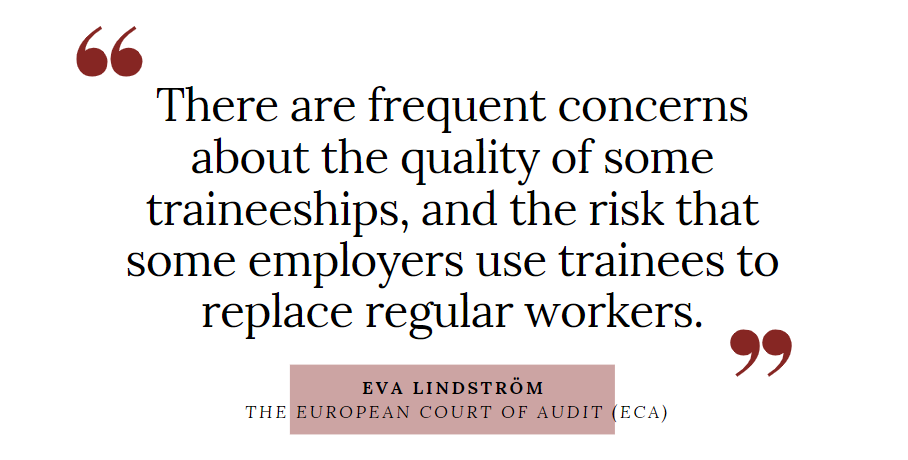Traineeships have become a key part of the early employment stages in the EU, with a growing number of young people completing (at least) one before they get a regular job. But the process can vary significantly, with loose terms and conditions and often no payment.
The number of young people doing a traineeship each year has risen to an estimated 3.7 million in the EU. However a review by the European Court of Auditors (ECA) now warns of unequal opportunities and access to traineeships.
"It is clear that traineeships have become an increasingly important point of entry into the labour market," Eva Lindström, the European Court of Audit (ECA) member who led the review, told The Brussels Times.
"If everything goes well, traineeships could and should be a means of facilitating the transition for young people into the labour market. But at the same time, there are frequent concerns about the quality of traineeships and the risk that some employers use trainees to replace regular workers. That is not how it is supposed to be."
Quality internships
The share of young people who have completed a traineeship has increased greatly in the past decade, Eurobarometer opinion surveys show. However, for traineeships to be useful, trainees must be sure of their quality and should not replace regular employees.
Ten years ago, the Council of the EU made the (non-binding) recommendation that Member States should set out minimum requirements for quality traineeships, including learning objectives, a written contract, fair working conditions, and reasonable duration.
But the Council recommendation does not include remuneration as a 'quality' factor and the latest Eurobarometer survey (2023) found that nearly half of interns (45%) across the EU were unpaid and 67% did not have full access to social protection.

Credit: Pexels
"This obviously poses a problem for young people who then have to turn down a traineeship because they cannot afford to do one," said Lindström. "As a result, this makes it difficult for disadvantaged young people to enter the labour market."
Trade unions and youth organisations have long been urging the EU to create a law banning unpaid internships, a demand they are now doubling down on in the run-up to the elections in June. The present arrangement often results in unequal opportunities and conditions for young people, which is especially dangerous in combination with traineeships becoming more important.
Accentuating inequality
"Some young people (and employers as well) might think that having one, two or even three internships on your CV is a necessity," Lindström said. "But if they are not properly remunerated, young people without financial support from their families might not be able to afford to work for free."
Not only does this lead to inequality between young people in different Member States, it also opens the gap between people from less advantaged socioeconomic backgrounds who might not be able to work for free and others in the same country from a more financially secure background. This difference then filters through to the labour market.
"It comes down to this crucial question: What is an internship about? Is it mostly about learning, or is it about working? Ideally, it should be both," said Lindström.
The answer, however, is not as simple: it has to do with EU competence. "If internships are only about learning, the EU has very little competence in the area, leaving it up to the Member States as a part of their educational system. But if it is about working, then EU legislation kicks in, for remuneration but also for social security."
Additionally, the definition of "traineeship" still differs substantially between Member States: 16 of them do not even have a legal definition, making it difficult to collect comparable and reliable data.
Related News
- 'This exploitation cannot continue': EU urged to ban unpaid internships
- European Parliament votes to ban unpaid internships across EU
- ‘Ramen noodles only’: Unpaid internships cost young people over €1,000/month
While the EU provides funding for traineeships, there is no information on the specific amounts involved or the exact number of trainees receiving EU support. In turn, this lack of accurate information or exact numbers hinders evidence-based policymaking.
"With the huge increase in people who have done at least one internship, it should be even more important for decision-makers – from national to EU level – to ensure that they are qualitative," Lindström said. "Internships are very often part of being young and trying to enter the labour market today, but the current system only leads to inequalities."


